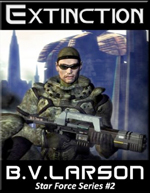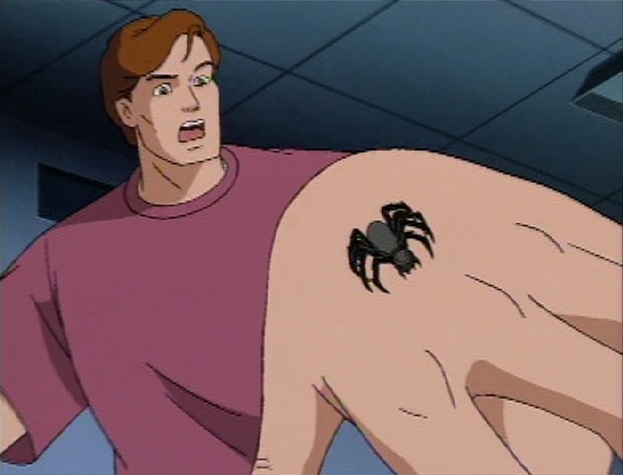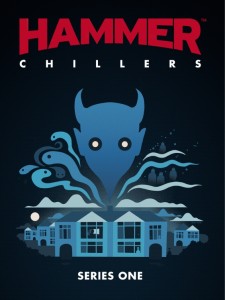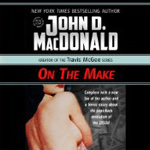
 Extinction (Star Force #2)By B.V. Larson; Performed by Mark Boyett
Extinction (Star Force #2)By B.V. Larson; Performed by Mark Boyett
Publisher: Brilliance Audio
[UNABRIDGED] – 12 hours
Themes: / aliens / military sci-fi / fighting bugs /
Publisher summary:
Earth’s Star Force Marines invade an alien world! In the second book of the Star Force series, Kyle Riggs has another bad year. The Nano ships have a new mission – one that sentences their pilots to death. Meanwhile, the governments of Earth want to steal Star Force’s Nano technology for their own. Worst of all, Earth has made a promise to the Macros, and the machines are coming to collect. Extinction is the story of Earth’s entry into an interstellar war between living creatures and machines. To buy the peace, we’ve signed up with the machines.
If the first book of B. V. Larson’s Starforce series set humanity at the center of a conflict between Replicators and Terminators, this second entry sticks with that mostly successful formula and improves on it with a healthy dose of Starship Troopers. Kyle Riggs remains the protagonist and narrator of the story and all the important characters from the previous novel return and see some development. The plot of Extinction can be broken into five major acts, which for the purpose of this review I will call Return to Earth, Independence, Exploration, Growth, and Fighting Bugs.
The Return to Earth portion of the story brings Kyle back from the confrontation around Venus that ended Swarm. It essentially serves to reintroduce readers to his character and give some nods to character development. Gone is the mild-mannered university professor of the previous novel. Riggs has been transformed by his experiences in South America and around Venus and is now a hard as nails military commander. Larson devotes just enough time to the deaths of Riggs’s children and the other horrors of Swarm to show that his protagonist still has a human side, despite being enhance by a body full of nanites.
The portion of the story that I think of as Independence finally brings some serious political intrigue to the series. I know that this is Starforce, not Game of Thrones, but it’s nice to see some consideration given to the big picture. In addition to establishing clear political relations between Starforce and the nations of Earth, this second portion of the novel develops the relationship between Riggs and his sometimes-commander Crow. Sandra is back as well and, while Riggs still appears to treat her as little more than a sex machine and foil for exposition, the author at least gives Sandra more freedom to act. She even surprises Riggs a few times throughout the story by taking initiative in difficult situations and pushing him to make the right decisions.
The Exploration and Growth portions of the story race by as quickly as the year of plot time that they encompass. Larson pulls in more elements from the science fiction cannon in these sections, with star gates, inertial suppression (or the lack thereof), and the difficulties of negotiating with artificial intelligences all adding their flavors to the story. Little can be said about this portion of the story without giving away the plot points, so I’ll just say that if you like fast moving exposition about strange planets and alien technology, this part of the story is a great read.
Everything in the book builds up to the final portion of the story, which can be summarized in two words: Fighting Bugs.
The alien enemies in this portion of the story are truly alien, even if we have seen similar creatures from other series, and they give the Starforce marines a good fight. Thousands of nanite-enhanced marines and machine gun-toting aliens are slaughtered on the altar of audience entertainment in a bloodbath of storytelling that rivals the plot of Starcraft. If that sort of action is what you are looking for, then this book will be exactly your cup of energy drink. On the other hand, this section of the book does have a distinctly video game feel to it, as Kyle Riggs slogs neck deep through the blood of literally thousands of other humans and aliens as they are slaughtered all around him. Sure, readers need a hero with which to identify, but at some point you stop caring about Kyle Riggs as a character and just assume that he will survive any situation to get the reader to the next battle.
I think that this book should mark the decision point for readers. Two books into the Starforce series, Larson has clearly established what sort of story he is telling. If you like this particular brand of military scifi, you’re going to get your fill. Larson does little to expand on already existing science fiction tropes, but like a very talented Lego artist, he continues to stick these already existing elements together to build new stories that are quite cool, even if the edges are a bit rough and the construction materials easily recognizable.
The production quality of this audiobook was excellent. Mark Boyett provides the perfect narration for a character who still retains elements of his former life, but is slipping deeper into his role as a cold-hearted commander. The CD version I listened to comes on ten discs, each of which begins and ends with a short musical cue. I started to find the narration a little slow in parts, so about three hours in I set my iPod to double-speed and was much more content. Don’t take this to mean that the narration is too slow. I think it is perfect, as the standard speed is just right for people who are new to audiobooks and long time listeners like me can double it with little distortion.
Posted by Andrew Linke
 Dear Girls Above Me
Dear Girls Above Me
 Star Wars: Dawn of the Jedi: Into the Void
Star Wars: Dawn of the Jedi: Into the Void

 On the Make
On the Make